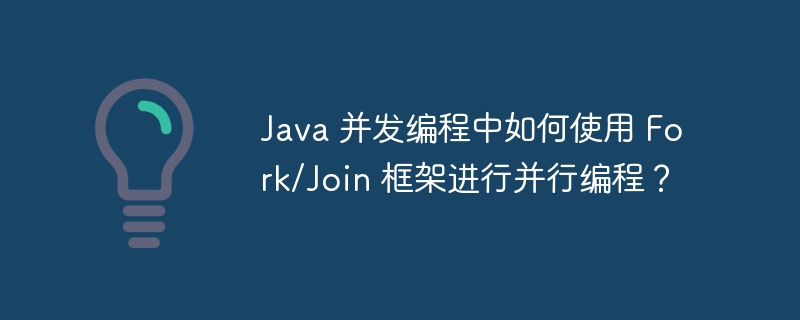 Java
Java
 javaTutorial
javaTutorial
 How to use the Fork/Join framework for parallel programming in Java concurrent programming?
How to use the Fork/Join framework for parallel programming in Java concurrent programming?
How to use the Fork/Join framework for parallel programming in Java concurrent programming?
How to use Java Fork/Join framework for parallel programming? Create a task class and implement the RecursiveAction or RecursiveTask interface. Create Fork/Join pool and manage task execution. Call the fork() method to submit the task to the pool and decompose it into subtasks. Call the join() method to wait for the task to complete and get the results (for RecursiveTask).

Java Concurrent Programming: Parallel Programming Using the Fork/Join Framework
The Fork/Join Framework is a Java library that provides A lightweight framework for efficiently executing parallel tasks. It is based on a work-stealing algorithm that enables threads to collaborate on tasks, thereby maximizing utilization of CPU resources.
How to use the Fork/Join framework:
-
Create a task class: This class needs to implement
java.util. concurrent.RecursiveActionorjava.util.concurrent.RecursiveTaskinterface. RecursiveAction is used to perform tasks that do not return a value, while RecursiveTask does. -
Create a Fork/Join pool: Use
java.util.concurrent.ForkJoinPoolto create a thread pool. It will manage the execution of Fork/Join tasks. -
Fork task: Call the
fork()method to submit the task to the Fork/Join pool. The pool breaks tasks into smaller subtasks and assigns them to available threads. -
Join task: Call the
join()method to wait for the task to complete. For RecursiveTask, it also returns the return value to the main thread.
Practical case:
Suppose we have a parallel task that calculates the sum of all odd numbers in a list of numbers. We can implement this using the Fork/Join framework as follows:
import java.util.concurrent.ForkJoinPool;
import java.util.concurrent.RecursiveAction;
public class OddSumTask extends RecursiveAction {
private int[] numbers;
private int start;
private int end;
public OddSumTask(int[] numbers, int start, int end) {
this.numbers = numbers;
this.start = start;
this.end = end;
}
@Override
protected void compute() {
int sum = 0;
for (int i = start; i < end; i++) {
if (numbers[i] % 2 != 0) {
sum += numbers[i];
}
}
System.out.println("Partial sum: " + sum);
}
}
public class Main {
public static void main(String[] args) {
// 创建一个数字列表
int[] numbers = {1, 2, 3, 4, 5, 6, 7, 8, 9, 10};
// 创建一个 Fork/Join 池
ForkJoinPool pool = new ForkJoinPool();
// 创建一个 OddSumTask
OddSumTask task = new OddSumTask(numbers, 0, numbers.length);
// Fork 任务
pool.invoke(task);
}
}Running this code will add the odd numbers in the list and print out the local sum calculated by each thread.
The above is the detailed content of How to use the Fork/Join framework for parallel programming in Java concurrent programming?. For more information, please follow other related articles on the PHP Chinese website!

Hot AI Tools

Undresser.AI Undress
AI-powered app for creating realistic nude photos

AI Clothes Remover
Online AI tool for removing clothes from photos.

Undress AI Tool
Undress images for free

Clothoff.io
AI clothes remover

AI Hentai Generator
Generate AI Hentai for free.

Hot Article

Hot Tools

Notepad++7.3.1
Easy-to-use and free code editor

SublimeText3 Chinese version
Chinese version, very easy to use

Zend Studio 13.0.1
Powerful PHP integrated development environment

Dreamweaver CS6
Visual web development tools

SublimeText3 Mac version
God-level code editing software (SublimeText3)

Hot Topics
 Square Root in Java
Aug 30, 2024 pm 04:26 PM
Square Root in Java
Aug 30, 2024 pm 04:26 PM
Guide to Square Root in Java. Here we discuss how Square Root works in Java with example and its code implementation respectively.
 Perfect Number in Java
Aug 30, 2024 pm 04:28 PM
Perfect Number in Java
Aug 30, 2024 pm 04:28 PM
Guide to Perfect Number in Java. Here we discuss the Definition, How to check Perfect number in Java?, examples with code implementation.
 Random Number Generator in Java
Aug 30, 2024 pm 04:27 PM
Random Number Generator in Java
Aug 30, 2024 pm 04:27 PM
Guide to Random Number Generator in Java. Here we discuss Functions in Java with examples and two different Generators with ther examples.
 Armstrong Number in Java
Aug 30, 2024 pm 04:26 PM
Armstrong Number in Java
Aug 30, 2024 pm 04:26 PM
Guide to the Armstrong Number in Java. Here we discuss an introduction to Armstrong's number in java along with some of the code.
 Weka in Java
Aug 30, 2024 pm 04:28 PM
Weka in Java
Aug 30, 2024 pm 04:28 PM
Guide to Weka in Java. Here we discuss the Introduction, how to use weka java, the type of platform, and advantages with examples.
 Smith Number in Java
Aug 30, 2024 pm 04:28 PM
Smith Number in Java
Aug 30, 2024 pm 04:28 PM
Guide to Smith Number in Java. Here we discuss the Definition, How to check smith number in Java? example with code implementation.
 Java Spring Interview Questions
Aug 30, 2024 pm 04:29 PM
Java Spring Interview Questions
Aug 30, 2024 pm 04:29 PM
In this article, we have kept the most asked Java Spring Interview Questions with their detailed answers. So that you can crack the interview.
 Break or return from Java 8 stream forEach?
Feb 07, 2025 pm 12:09 PM
Break or return from Java 8 stream forEach?
Feb 07, 2025 pm 12:09 PM
Java 8 introduces the Stream API, providing a powerful and expressive way to process data collections. However, a common question when using Stream is: How to break or return from a forEach operation? Traditional loops allow for early interruption or return, but Stream's forEach method does not directly support this method. This article will explain the reasons and explore alternative methods for implementing premature termination in Stream processing systems. Further reading: Java Stream API improvements Understand Stream forEach The forEach method is a terminal operation that performs one operation on each element in the Stream. Its design intention is






